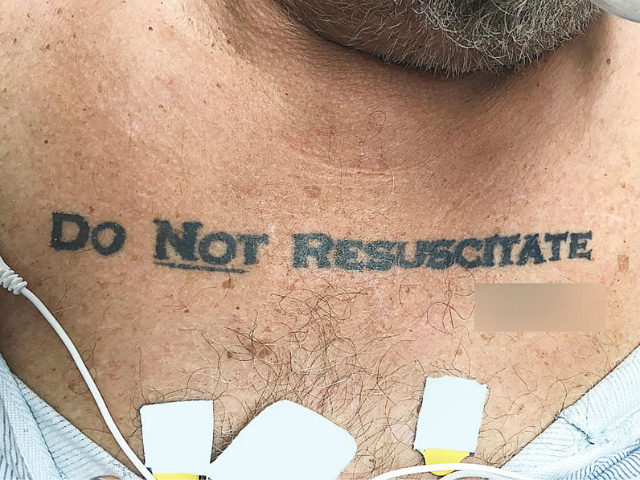Doctors at a Florida hospital were faced with an ethical dilemma after an unconscious patient with a “do not resuscitate” tattoo across his chest had been brought to the emergency room, according to a case study published Thursday.
The study, published in the New England Journal of Medicine, notes that the 70-year-old man had been brought to Jackson Memorial Hospital unconscious and with no family or identification, but his chest tattoo seemed to convey his wishes to deny advanced life support.
The tattoo had the word “Not” underlined and included his signature.
The patient’s medical team had to consider some legal and ethical questions, such as whether or not the tattoo was legally sound or accurately represented the patient’s wishes.
“We initially decided not to honor the tattoo, invoking the principle of not choosing an irreversible path when faced with uncertainty,” the study said.
Doctors said the man had an infection that caused him to go into septic shock, which leads to organ failure and critically low blood pressure.
They gave him intravenous fluids, blood pressure medication, and antibiotics to give themselves more time to make the life-or-death decision.
The patient’s medical team looked to a 2012 study in the Journal of General Internal Medicine for guidance. The case study told the tale of a 59-year-old patient who had “D.N.R.” tattooed across his chest but told doctors he wanted advanced life support to be performed in case of an emergency.
When his doctors asked why he had the tattoo, the patient replied that he “lost a bet playing poker,” according to the paper.
The state of Florida requires that all “do-not-resuscitate” orders be printed on yellow paper with a physician’s signature, so Jackson Memorial’s doctors consulted with an ethicist.
The ethicist told them that the tattoo could accurately represent the patient’s wishes.
“After reviewing the patient’s case, the ethics consultants advised us to honor the patient’s do not resuscitate (DNR) tattoo,” doctors noted in the study. “They suggested that it was most reasonable to infer that the tattoo expressed an authentic preference.”
Social workers later tracked down the man’s DNR paperwork using his fingerprints to ensure his request was legally valid.
The man’s condition worsened, and he died the following morning.

COMMENTS
Please let us know if you're having issues with commenting.